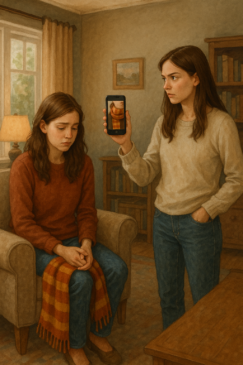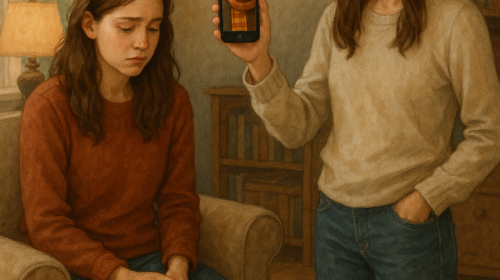Scarves may seem like small things, but the right one can feel like a piece of your heart: a reminder of a trip, a special gift, a comfort on cold days. For me, that scarf was a pale blue cashmere one I’d saved up for and bought during a solo trip to Scotland—my first ever adventure alone. I wore it every winter, every time I needed to feel a little brave. It was my talisman.
That’s why it stung so much when my sister, Rachel, not only borrowed my scarf without asking but gave it away—to someone I barely knew.
The Disappearing Act
It started with a missing spot in my closet. I searched my room, checked under car seats and in the laundry, but my favorite scarf was gone. I asked Rachel if she’d seen it, but she shrugged, eyes a little too wide. “No idea. Maybe you left it somewhere?”
A week later, scrolling through Instagram, I saw a photo from one of Rachel’s friends. There she was—wearing my blue scarf, tagged at a downtown coffee shop, laughing with friends. The caption read, “Thanks for the cozy vibes, Rach!” My stomach dropped.

The Confrontation
I confronted Rachel that night. “You took my scarf,” I said, holding up my phone as proof.
She rolled her eyes. “I just borrowed it. But then Natalie loved it so much, and she was having a rough week, so I gave it to her. You have other scarves.”
It was as if my feelings—and the history of that scarf—didn’t matter. I tried to explain. “It wasn’t just any scarf. I bought it for myself in Scotland. It means something to me.”
Rachel scoffed. “You’re being dramatic. It’s just a scarf.”
When “Just a Scarf” Means More
But it wasn’t. That scarf was the first thing I’d bought for myself after working up the nerve to travel alone. It reminded me I could be independent and strong. Losing it to a thoughtless whim cut deeper than I expected.
I wanted to demand it back, to message Natalie and tell her the truth. But I also knew that would only create more drama and resentment. Instead, I told Rachel plainly: “You can’t just take things that aren’t yours, especially when they mean something. You owe me an apology.”
She finally saw the hurt on my face and softened. “I’m sorry. I honestly didn’t think it mattered. I’ll try to get it back.”
What I Learned
The scarf never made its way home, but something else changed. Rachel started asking before borrowing things, and even bought me a new scarf that Christmas. It wasn’t the same, but the gesture mattered.
I learned that boundaries need to be spoken—loud and clear. Not everyone sees the hidden meaning in our treasures, and sometimes, even those closest to us need reminders.
Final Thought
If someone treats your special things like they’re disposable, don’t be afraid to speak up. The objects that carry your memories are worth protecting—even when others don’t understand why.



